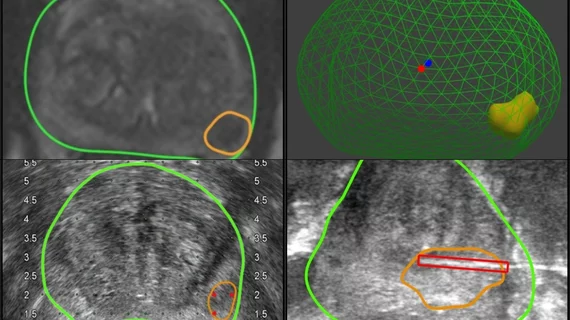AI software creates 3D model from MRI, ultrasound scans to enhance prostate cancer detection
An AI software system called SmartTarget—which overlays tumor information from MRI scans onto ultrasound images—may help guide surgeons in conducting biopsies and improve prostate cancer detection by reducing the number of unidentified cases, according to research published online Dec. 5 in the journal European Urology.
Developed by researchers from University College London, the system uses AI-based machine learning and advanced image processing to take patient MRIs and create 3D models of their prostate while also identifying malignancies. The model is then fused with ultrasound images during biopsy to help surgeons target areas of concern while operating.
“Prostate cancer detection has been improving at a very fast rate in recent years and this technology pushes the science forward even further, enabling clinicians to pick up prostate cancer quickly so that patients can access the right treatment early enough,” co-senior author Hashim Ahmed, PhD, chair of urology at Imperial College London, said in a prepared statement.
For the study, 129 patients with suspected prostate cancer underwent two biopsies—one using the SmartTarget system and one where surgeons could only visually review MRI scans. A total of 93 prostate cancers were detected with the two strategies combined, with each picking up 80 of the cancers and missing 13 that their competing method found.
From their findings, the researchers suggested the visual review of MRI scans should be used in conjunction with SmartTarget as surgeons may be able to more accurately gather information about the size, shape and location of prostate tumors during biopsy which is otherwise invisible on ultrasound. More so, the software may reduce a patient’s number of biopsies and reduce unnecessary surgeries caused by overdiagnosis.
“The software provides them [surgeons] with a clear target. As MRI-targeted biopsies require a very high degree of expertise and experience, we hope that the imagery displayed by SmartTarget will help to bring high accuracy prostate cancer diagnosis to a much wider range of patients and hospitals,” said co-senior author and inventor of the SmartTarget system Dean Barratt, PhD, in the same statement.

